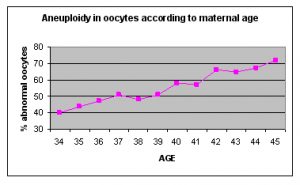
- Written:
- Author: Edward
- Posted in: aging, dr ed park, evolution, sex, Telomere erosion
- Tags: Aging, aneuploidy, Dr. Ed Park, evolution, gametogenesis, meiosis, menopause, mother nature, natural selection, telomerase
As I was dreaming this morning, a theory of aging came to me that might explain aging as an adaptation: mother nature ages us because it wants to kill women.
Bear with me here. Natural selection and competitive advantage are the fundamentals of evolutionary theory so any explanation for aging as a positive adaptation has to take this into account. What if aging ensures that the risks of aneuploidy (abnormal chromosome number) are minimized?
On the face of it, it would seem that living longer confers a person with more opportunities to breed. This is only true for men because the nature of spermatogenesis allows older men to create relatively normal gametes for a lifetime although arguably the epigenetics may confer greater risks of autism and even other mutations. Interestingly, children of older fathers have longer telomeres owing to the hyperefficient protection of the male germ line. The sperm number in the trillions over a lifetime, so they are high, number, low survival, or “R-type” in their strategy.
In contrast, women are “K-Type” when it comes to eggs. They only make one a month and the physical as well as lifelong commitment to those gametes, if fertilized, are very high stakes.
Unfortunately, it is very hard to preserve egg chromosomes for decades and as this graph  shows, the abnormal chromosome number from eggs either frozen in meiosis for decades or as a result of repeated copying and telomere shortening for decades, is very significant.
shows, the abnormal chromosome number from eggs either frozen in meiosis for decades or as a result of repeated copying and telomere shortening for decades, is very significant.
So my basic theory is this: given that chromosome mutations increase by the time that women are in their 30’s, and that increased mutations are a negative selection pressure… natural selection prefers women who will procreate, stop ovulating, and not produce abnormal fetuses.
If the inability to keep the chromosomes segregating properly is a fixed problem that is not easily mitigated by simply increasing telomerase activity and allowing healthy reproduction into your 60s and beyond (because it takes so much effort to raise children), then the natural selection benefit of slower aging would not be expressed in evolutionary terms as a selective advantage.
I would be interested to hear your thoughts. Could aging have evolved to keep women from surviving long enough to produce changes to the human genome? Dying young but with perfect babies is sustainable and advantaged; dying old but with abnormal babies is an evolutionary dead end.


3 thoughts on “What if aging was meant to kill women?”
That is in fact a quite brilliant question… seems plausible … ( but i Can only guess the reactions in the popular media 😀😀😀).
Um. Nope. Just … nope. Our hormones dry up and egg production stops. Men age, too and die off. Yeah they keep producing those little buggers but if their mate has no eggs … no problem.
My personal take on aging is that it is what has been modeled for us since we popped out of the womb. We think that aging and dying is the norm. I say it isn’t. I call horsepucky on that notion.
But then, I also have read several books on quantum physics, the nature of reality, the possibility that the universe is a hologram with all that that implies AND I have held a strong belief in reincarnation since I first came across the 2nd law of thermodynamics.
Reincarnation … the ultimate recycling plan.
So here’s the rest of my argument … using this society as my example. We come here and spend 20 years or so growing a new body, learning a new language, going to school, getting properly socialized etc. Then we (usually) pair up and start a family, find a career, and 40 years+ later are shuffled out the door towards the exit. REALLY?!
To me, this life is an E-ticket ride. We are meant to be here and enjoy the creation and having a paltry 60-80 years is just not enough time. I vote for real longevity. Bare minimum of 200 years. And I’ve been saying for about 20 of those years that 1,000 would be better. 😉
Oops. I meant the first law of thermodynamics. duh